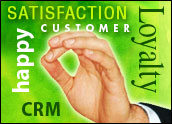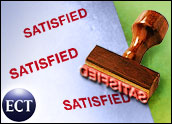
I take between three and seven briefings each week from software companies. Some of these companies are known quantities that I like to keep up with, while others are new to me or possibly new to the world. Most times, companies are looking for an objective opinion on a plan, a message or an idea — and they figure there’s always a chance I might mention them here. That’s certainly happened, though I am afraid my track record seems to run in the other direction. I am frequently critical, so be careful what you wish for.
Fair is fair, though, and if I have something critical to say, I say it in the briefing and withhold the name of the company if I write about a topic relevant to them. Of course, companies in the public eye that make announcements or otherwise draw attention are fair game, just not the ones opening up the kimono and asking for an opinion.
Last week, a small company briefed me on its products and strategies, which focused on customer satisfaction, though it really wanted to position itself as a loyalty solution. The whole thing told me a lot about where we are on the loyalty frontier.
Customer Satisfaction
It really is a frontier. There’s very little settled. A lot of what happens in the loyalty discussion is really about satisfaction. We are still in a period when customer satisfaction is the dominant idea, though it appears to be fading. Satisfaction has been bandied about by companies trying to convince new prospects of their worthiness for quite a while. A few years ago, a cottage industry evolved that was dedicated to identifying and measuring satisfaction and then applying it to generate ROI — but something happened on the way to utopia.
Critical observers noticed a gap opening up where satisfaction promoters said there should not have been one, as supposedly satisfied customers showed a propensity to march right through the gap to defect to a competitor. How could they defect if they were satisfied? We all scratched our heads for a while as if we were trying to untwist one of those brain-teasers the guys on NPR’s “Car Talk” uncork each week. The short answer is, they can and they do. A slightly longer explanation is that satisfaction dwells primarily on the past, and loyalty is about the future. A lot of satisfaction is about feeling you got what you paid for.
Loyalty takes things a step further and tries to figure out if you’d do it again — if you’d buy more. You aren’t loyal if you feel you did not get a good deal, and you are looking for a new vendor — that’s a given. Also, if you can’t buy more — perhaps your budget is shot or the need is taken care of for the foreseeable future — you’re not loyal either. However, if you feel you got a good deal, you might be a good reference. Lastly, you are not loyal if you feel you got what you paid for, but it wasn’t enough — or you have problems with the relationship for reasons that could include pricing, service or someone’s attitude. You are only loyal if you are satisfied, and if you are ready and able to buy more and perhaps tell a friend.
Attitude vs. Behavior
That was my position going into the briefing where the company in question tried to show me a customer rating scale that went from dissatisfied through satisfied and all the way to loyal. Satisfaction and loyalty really are not on the same scale. Satisfaction is all about attitude; loyalty includes behavior.
Moreover, the company briefing me was only trying to measure the attitudes of people who voluntarily showed up to take a survey. How representative is that sample? Might the people who voluntarily show up have something of a bias that needs to be controlled for? In the end, we agreed to disagree.
My point in bringing this up is the revelation I got from this encounter. In early markets, almost no one has a whole product suited to a business need. The first players in are the first to be able to begin working on fleshing out a solution, and it’s no different in the ideas market. The evidence I see is that we are currently very early in the loyalty market.
From Definition to Measurement
Right now, we are at the stage where we are trying to identify what loyalty is and to develop logical ways of measuring it. Soon enough, a workable definition of loyalty will pervade the market (my definition comes mostly from Walker Information of Indianapolis, who seem to have it all figured out. Then, we will turn our attention to metrics and measurements, which will inevitably lead to reliably generating loyalty. Loyalty will become all the rage — just as customer satisfaction was. It will be the next thing on every CEO’s mind, and every pundit will have an opinion, and every vendor will have something to sell.
Loyalty will be so essential we’ll lose sight of what it is and why it’s important, and we will begin to look for ways to make it more affordable. Then, like a flock of sparrows changing direction in unison, we’ll all figure out a way to do loyalty for less. It won’t stay that way forever though. As soon as someone invents the next product that everyone has got to have, loyalty will be out the window. New markets are driven by early adopters who only need to be satisfied that a product gave them what they paid for — and in a new market, that’s a pretty low hurdle.
Denis Pombriant is a well known thought leader in CRM and the founder and managing principal of the Beagle Research Group, a CRM market research firm and consultancy. Pombriant’s latest white paper, Adding Sales to the Call Center Agenda, summarizes his recent research in the call center industry. In 2003, CRM Magazine named Pombriant one of the most influential executives in the CRM industry. Pombriant is currently working on a book to be published next year. He can be reached at [email protected]
























































